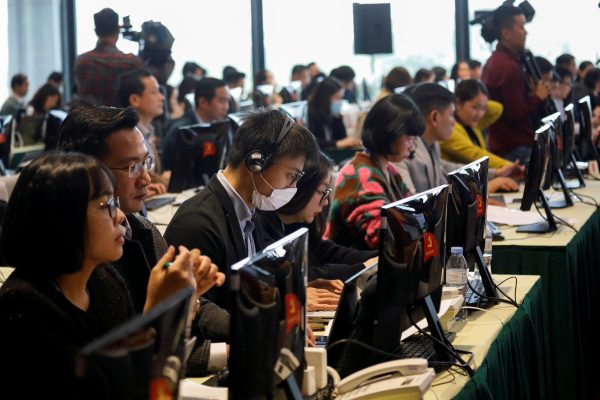A decree guiding the controversial Cybersecurity Law, which took effect in October 2022, looks to further empower Vietnamese authorities to censor online content they disfavour and bolster the state’s digital surveillance capacity. This regulatory move is just one of the latest in a spate of laws and regulations that reflect Hanoi’s attempt to exert ever-tighter controls over the digital space.
The heyday of Vietnam’s critical journalism in the 2000s was short-lived. In 2008, an unprecedented state-sanctioned crackdown on the press led to the arrest of two Vietnamese investigative journalists and the dismissal of the editors-in-chief of Tuoi Tre and Thanh Nien — the two most influential newspapers.
The authorities never clearly articulated their rationale for the crackdown, but it was likely because mainstream media crossed a line in its coverage of corruption. As the authorities lack the wherewithal to punish every single transgressor, their strategy of choice has been to kill the chicken to scare the monkey — a tactic that seems to be working.
The 2008 crackdown has sparked fear in Vietnamese newsrooms, inducing news uniformity and self-censorship. The editorial line of mainstream media has revolved chiefly around amplifying official sources and state-sanctioned narratives. Coverage of governance malfeasance and corruption at the central level has been dictated by political consensus and elite framing of the Vietnamese party-state.
Vietnamese authorities have repeatedly urged the mainstream media to embrace digital technology. But the facade of innovation in Vietnam’s media landscape and the blossoming of news outlets run by private tech companies should not be interpreted as a bellwether for a more independent press.
All press agencies in Vietnam, including those run by private tech companies, must be placed under the remit of the party-state. Being subject to market pressures while also at the behest of Vietnamese propaganda officials, there are no signs that those tech companies will venture into editorial independence.
Vietnamese authorities have also appeared increasingly emboldened to dangle the threat of withdrawing the license of any news outlet that they consider to have strayed from the party line. Nowhere is this strategy more manifest than in state-led efforts to increase and centralise state control over the media by axing or merging hundreds of press organisations. Hanoi aims to slash around 180 press organisations across the country by 2025.
The authorities have justified this move as essential to the revamping of the bloated bureaucracy and overlapping ownership that have plagued the news industry. While the plan is legitimate to some extent, its critics have lamented that authorities are using it as a smokescreen to crack down on news outlets perceived to be straying from the party line.
Such strong controls epitomise how the Vietnamese party-state has sought to engineer a superficial openness to camouflage a tighter grip on public discourse in both the mainstream press and cyberspace. But the move to control the official narrative on all fronts is likely to come back to bite Vietnamese authorities.
The intensification of news uniformity could further nudge an already disenchanted public towards alternative sources of information, that, while welcome, are not uniformly reliable. Too much reliance on these sources, exacerbated by the lack of trust in official narratives, could leave the public primed to believe any criticism of the Vietnamese government, even if such criticism is not well substantiated.
To aggravate the problem, in an era of swelling social media, the Vietnamese public is all the more vulnerable to a deluge of fake news, disinformation and propaganda. That dynamic could fuel and perpetuate a vicious cycle — the more people are exposed to fake news, the more they lose trust in the mainstream media and its narratives. This would fly in the face of fanfare government rhetoric about stemming the onslaught of fake news and misinformation.
If the government means to walk the talk on curbing misinformation, it has to begin with empowering the mainstream media to produce more critical, objective and relatable journalism, instead of making it churn out uniform coverage.
A more critical and robust press will not necessarily translate into any intent to undermine the Communist Party’s leadership. Rather it plays a crucial role in improving effective policymaking — bolstering the country’s ability to tackle rampant corruption and boosting incentives to reform the economy — all of which would fortify the regime’s legitimacy.
While social media has become an incubator of fake news and misinformation, sanitising it altogether is likely to cost the Vietnamese government a useful online feedback loop.
If the authorities view popular discontent as a source of instability, shutting down all venues for the public to air their grievances may be a source of instability as well. As the political scientist Martin Dimitrov pointed out — any regime should be on edge when its people stop bringing forward their complaints, as it is evident of public disregard for that state’s legitimacy.
Dien Luong is visiting fellow at the ISEAS – Yusof Ishak Institute, Singapore.
This piece is an abridged version of two articles, originally published in Fulcrum and ISEAS Perspective.

